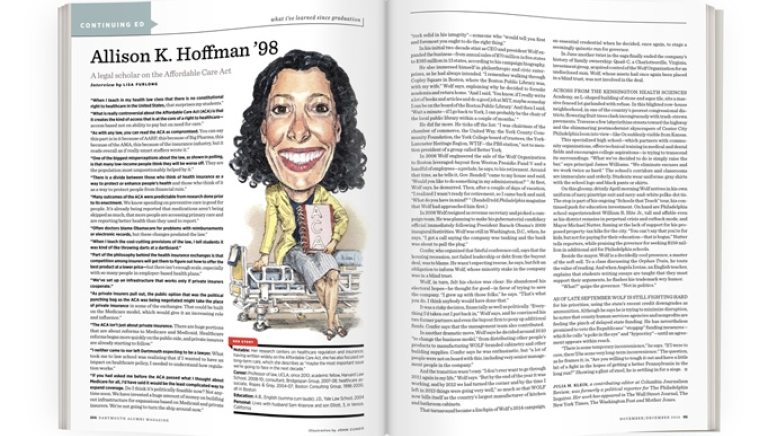Notable: Her research centers on healthcare regulation and insurance; having written widely on the Affordable Care Act, she has also focused on long-term care, which she describes as “maybe the most important issue we’re going to face in the next decade.”
Career: Professor of law, UCLA, since 2010; academic fellow, Harvard Law School, 2008-10; consultant, Bridgespan Group, 2007-08; healthcare associate, Ropes & Gray, 2004-07; Boston Consulting Group, 1998-2000, all in Boston
Education: A.B., English (summa cum laude); J.D., Yale Law School, 2004
Personal: Lives with husband Sam Krasnow and son Elliott, 3, in Venice, California
“When I teach in my health law class that there is no constitutional right to healthcare in the United States, that surprises my students.”
“What is really controversial about the Affordable Care Act (ACA) is that it creates the kind of access that is at the core of a right to healthcare—access based not on ability to pay but on need for care.”
“As with any law, you can read the ACA as compromised. You can say this part is in it because of AARP, this because of Big Pharma, this because of the AMA, this because of the insurance industry, but it reads overall as if really smart staffers wrote it.”
“One of the biggest misperceptions about the law, as shown in polling, is that many low-income people think they will be worse off. They are the population most unquestionably helped by it.”
“There is a divide between those who think of health insurance as a way to protect or enhance people’s health and those who think of it as a way to protect people from financial ruin.”
“Many outcomes of the ACA were predictable from research done prior to its enactment. We know spending on preventive care is good for people. It’s already being reported that medications aren’t being skipped as much, that more people are accessing primary care and are reporting better health than they used to report.”
“Often doctors blame Obamacare for problems with reimbursements or electronic records, but these changes predated the law.”
“When I teach the cost-cutting provisions of the law, I tell students it was kind of like throwing darts at a dartboard.”
“Part of the philosophy behind the health insurance exchanges is that competition among insurers will get them to figure out how to offer the best product at a lower price—but there isn’t enough scale, especially with so many people in employer-based health plans.”
“We’ve set up an infrastructure that works only if private insurers cooperate.”
“As private insurers pull out, the public option that was the political punching bag as the ACA was being negotiated might take the place of private insurance in some of the exchanges. That could be built on the Medicare model, which would give it an increasing role and influence.”
“The ACA isn’t just about private insurance. There are huge portions that are about reforms to Medicare and Medicaid. Healthcare reforms began more quickly on the public side, and private insurers are already starting to follow.”
“I neither came to nor left Dartmouth expecting to be a lawyer. What took me to law school was realizing that if I wanted to have an impact on healthcare policy, I needed to understand how regulation works.”
“If you had asked me before the ACA passed what I thought about Medicare for all, I’d have said it would be the least complicated way to expand coverage. Do I think it’s politically feasible now? Not anytime soon. We have invested a huge amount of money on building out infrastructure for expansions based on Medicaid and private insurers. We’re not going to turn the ship around now.”




